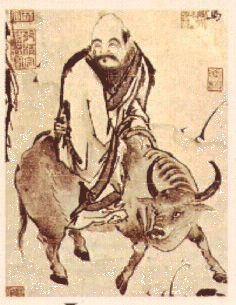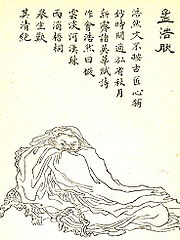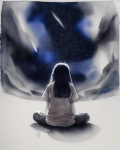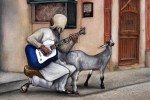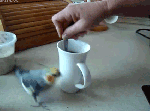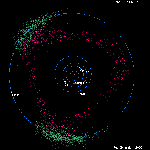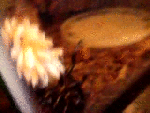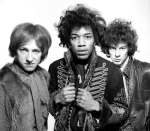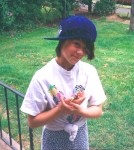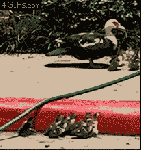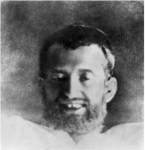I’ve talked myself into doing chunks of this that have some commonality. Today I’ve culled poems attributed to Han Shan, poet-mystic of the early T’ang. First, excerpts from the wikipedia article about Han Shan (for the full article go here):
Hanshan (Chinese: 寒山; pinyin: Hánshān; literally “Cold Mountain”, fl. 9th century) was a legendary figure associated with a collection of poems from the Chinese Tang Dynasty in the Taoist and Chan tradition. He is honored as an incarnation of the Bodhisattva -figure Manjusri in Zen lore. In Japanese and Chinese paintings he is often depicted together with his sidekick ShideFenggan another monk with legendary attributes.
—
The collection of poems attributed to Hanshan may span the entire Tang Dynasty as Edwin G. Pulleyblank asserts in his study Linguistic Evidence for the Date of Hanshan.[1] identifies him as the monk Chiyan (智岩, 577 – 654), but that has been disputed by Paul Demiéville among others. The Encyclopedia of China gives his date as around 712 and after 793. Jia Jinhua came to the conclusion, after a study of Chan phrases in some 50 of the poems, that this particular group of poems may be attributable to the Chan monk Caoshan Benji (840-901).
Personally, I think a great place to start is the collection of Cold Mountain Poems by Gary Snyder, one of the great beatnik era poets often associated with other poets and writers of that cultural phenomenon. Snyder was a very complimentary voice to bring Han Shan to America. Without further ado, I’ll just insert the Snyder Cold Mountain Poems here:
HAN SHAN, THE COLD MOUNTAIN POEMS, tr. Gary Snyder
Preface to the Poems of Han-shan
by Lu Ch’iu-yin, Governor of T’ai Prefecture
No one knows what sort of man Han-shan was. There are old people who knew him: they say he was a poor man, a crazy character. He lived alone seventy Li (23 miles) west of the T’ang-hsing district of T’ien-t’ai at a place called Cold Mountain. He often went down to the Kuo-ch’ing Temple. At the temple lived Shih’te, who ran the dining hall. He sometimes saved leftovers for Han-shan, hiding them in a bamboo tube. Han-shan would come and carry it away; walking the long veranda, calling and shouting happily, talking and laughing to himself. Once the monks followed him, caught him, and made fun of him. He stopped, clapped his hands, and laughed greatly – Ha Ha! – for a spell, then left.
He looked like a tramp. His body and face were old and beat. Yet in every word he breathed was a meaning in line with the subtle principles of things, if only you thought of it deeply. Everything he said had a feeling of Tao in it, profound and arcane secrets. His hat was made of birch bark, his clothes were ragged and worn out, and his shoes were wood. Thus men who have made it hide their tracks: unifying categories and interpenetrating things. On that long veranda calling and singing, in his words of reply Ha Ha! – the three worlds revolve. Sometimes at the villages and farms he laughed and sang with cowherds. Sometimes intractable, sometimes agreeable, his nature was happy of itself. But how could a person without wisdom recognize him?
I once received a position as a petty official at Tan-ch’iu. The day I was to depart, I had a bad headache. I called a doctor, but he couldn’t cure me and it turned worse. Then I met a Buddhist Master named Feng-kan, who said he came from the Kuo-ch’ing Temple of T’ien-t’ai especially to visit me. I asked him to rescue me from my illness. He smiled and said, “The four realms are within the body; sickness comes from illusion. If you want to do away with it, you need pure water.” Someone brought water to the Master, who spat it on me. In a moment the disease was rooted out. He then said, “There are miasmas in T’ai prefecture, when you get there take care of yourself.” I asked him, “Are there any wise men in your area I could look on as Master?” He replied, “When you see him you don’t recognize him, when you recognize him you don’t see him. If you want to see him, you can’t rely on appearances. Then you can see him. Han-shan is a Manjusri (one who has attained enlightenment and, in a future incarnation, will become Buddha) hiding at Kuo-sh’ing. Shih-te is a Samantabbhadra (Bodhisattva of love). They look like poor fellows and act like madmen. Sometimes they go and sometimes they come. They work in the kitchen of the Kuo-ch’ing dining hall, tending the fire.” When he was done talking he left.
I proceeded on my journey to my job at T’ai-chou, not forgetting this affair. I arrived three days later, immediately went to a temple, and questioned an old monk. It seemed the Master had been truthful, so I gave orders to see if T’ang-hsing really contained a Han-shan and Shih-te. The District Magistrate reported to me: “In this district, seventy li west, is a mountain. People used to see a poor man heading from the cliffs to stay awhile at Kuo-ch’ing. At the temple dining hall is a similar man named Shih-te.” I made a bow, and went to Kuo-ch’ing. I asked some people around the temple, “There used to be a Master named Feng-kan here, Where is his place? And where can Han-shan and Shih-te be seen?” A monk named T’ao-ch’iao spoke up: “Feng-kan the Master lived in back of the library. Nowadays nobody lives there; a tiger often comes and roars. Han-shan and Shih-te are in the kitchen.” The monk led me to Feng-kan’s yard. Then he opened the gate: all we saw was tiger tracks. I asked the monks Tao-ch’iao and Pao-te, “When Feng-kan was here, what was his job?” The monks said, :He pounded and hulled rice. At night he sang songs to amuse himself.” Then we went to the kitchen, before the stoves. Two men were facing the fire, laughing loudly. I made a bow. The two shouted Ho! at me. They struck their hands together -Ha Ha! – great laughter. They shouted. Then they said, “Feng-kan – loose-tounged, loose-tounged. You don’t recognize Amitabha, (the Bodhisattva of mercy) why be courteous to us?” The monks gathered round, surprise going through them. “”Why has a big official bowed to a pair of clowns?” The two men grabbed hands and ran out of the temple. I cried, “Catch them” – but they quickly ran away. Han-shan returned to Cold Mountain. I asked the monks, “Would those two men be willing to settle down at this temple?” I ordered them to find a house, and to ask Han-shan and Shih-te to return and live at the temple.
I returned to my district and had two sets of clean clothes made, got some incense and such, and sent it to the temple – but the two men didn’t return. So I had it carried up to Cold Mountain. The packer saw Han-shan, who called in a loud voice, “Thief! Thief!” and retreated into a mountain cave. He shouted, “I tell you man, strive hard” – entered the cave and was gone. The cave closed of itself and they weren’t able to follow. Shih-te’s tracks disappeared completely..
I ordered Tao-ch’iao and the other monks to find out how they had lived, to hunt up the poems written on bamboo, wood, stones, and cliffs – and also to collect those written on the walls of people’s houses. There were more than three hundred. On the wall of the Earth-shrine Shih-te had written some gatha (Buddhist verse or song). It was all brought together and made into a book.
I hold to the principle of the Buddha-mind. It is fortunate to meet with men of Tao, so I have made this eulogy.

(big picture- click for full size)
THE COLD MOUNTAIN POEMS, tr. Gary Snyder
1
The path to Han-shan’s place is laughable,
A path, but no sign of cart or horse.
Converging gorges – hard to trace their twists
Jumbled cliffs – unbelievably rugged.
A thousand grasses bend with dew,
A hill of pines hums in the wind.
And now I’ve lost the shortcut home,
Body asking shadow, how do you keep up?
2
In a tangle of cliffs, I chose a place –
Bird paths, but no trails for me.
What’s beyond the yard?
White clouds clinging to vague rocks.
Now I’ve lived here – how many years –
Again and again, spring and winter pass.
Go tell families with silverware and cars
“What’s the use of all that noise and money?”
3
In the mountains it’s cold.
Always been cold, not just this year.
Jagged scarps forever snowed in
Woods in the dark ravines spitting mist.
Grass is still sprouting at the end of June,
Leaves begin to fall in early August.
And here I am, high on mountains,
Peering and peering, but I can’t even see the sky.
4
I spur my horse through the wrecked town,
The wrecked town sinks my spirit.
High, low, old parapet walls
Big, small, the aging tombs.
I waggle my shadow, all alone;
Not even the crack of a shrinking coffin is heard.
I pity all those ordinary bones,
In the books of the Immortals they are nameless.
5
I wanted a good place to settle:
Cold Mountain would be safe.
Light wind in a hidden pine –
Listen close – the sound gets better.
Under it a gray haired man
Mumbles along reading Huang and Lao.
For ten years I havn’t gone back home
I’ve even forgotten the way by which I came.
6
Men ask the way to Cold Mountain
Cold Mountain: there’s no through trail.
In summer, ice doesn’t melt
The rising sun blurs in swirling fog.
How did I make it?
My heart’s not the same as yours.
If your heart was like mine
You’d get it and be right here.
7
I settled at Cold Mountain long ago,
Already it seems like years and years.
Freely drifting, I prowl the woods and streams
And linger watching things themselves.
Men don’t get this far into the mountains,
White clouds gather and billow.
Thin grass does for a mattress,
The blue sky makes a good quilt.
Happy with a stone under head
Let heaven and earth go about their changes.
8
Clambering up the Cold Mountain path,
The Cold Mountain trail goes on and on:
The long gorge choked with scree and boulders,
The wide creek, the mist blurred grass.
The moss is slippery, though there’s been no rain
The pine sings, but there’s no wind.
Who can leap the word’s ties
And sit with me among the white clouds?
9
Rough and dark – the Cold Mountain trail,
Sharp cobbles – the icy creek bank.
Yammering, chirping – always birds
Bleak, alone, not even a lone hiker.
Whip, whip – the wind slaps my face
Whirled and tumbled – snow piles on my back.
Morning after morning I don’t see the sun
Year after year, not a sign of spring.
10
I have lived at Cold Mountain
These thirty long years.
Yesterday I called on friends and family:
More than half had gone to the Yellow Springs.
Slowly consumed, like fire down a candle;
Forever flowing, like a passing river.
Now, morning, I face my lone shadow:
Suddenly my eyes are bleared with tears.
11
Spring water in the green creek is clear
Moonlight on Cold Mountain is white
Silent knowledge – the spirit is enlightened of itself
Contemplate the void: this world exceeds stillness.
12
In my first thirty years of life
I roamed hundreds and thousands of miles.
Walked by rivers through deep green grass
Entered cities of boiling red dust.
Tried drugs, but couldn’t make Immortal;
Read books and wrote poems on history.
Today I’m back at Cold Mountain:
I’ll sleep by the creek and purify my ears.
13
I can’t stand these bird songs
Now I’ll go rest in my straw shack.
The cherry flowers are scarlet
The willow shoots up feathery.
Morning sun drives over blue peaks
Bright clouds wash green ponds.
Who knows that I’m out of the dusty world
Climbing the southern slope of Cold Mountain?
14
Cold Mountain has many hidden wonders,
People who climb here are always getting scared.
When the moon shines, water sparkles clear
When the wind blows, grass swishes and rattles.
On the bare plum, flowers of snow
On the dead stump, leaves of mist.
At the touch of rain it all turns fresh and live
At the wrong season you can’t ford the creeks.
15
There’s a naked bug at Cold Mountain
With a white body and a black head.
His hand holds two book scrolls,
One the Way and one its Power.
His shack’s got no pots or oven,
He goes for a long walk with his shirt and pants askew.
But he always carries the sword of wisdom:
He means to cut down sensless craving.
16
Cold Mountain is a house
Without beans or walls.
The six doors left and right are open
The hall is sky blue.
The rooms all vacant and vague
The east wall beats on the west wall
At the center nothing.
Borrowers don’t bother me
In the cold I build a little fire
When I’m hungry I boil up some greens.
I’ve got no use for the kulak
With hs big barn and pasture –
He just sets uo a prison for himself.
Once in he can’t get out.
Think it over –
You know it might happen to you.
17
If I hide out at Cold Mountain
Living off mountain plants and berries –
All my lifetime, why worry?
One follows his karma through.
Days and months slip by like water,
Time is like sparks knocked off flint.
Go ahead and let the world change –
I’m happy to sit among these cliffs.
18
Most T’ien-t’ai men
Don’t know Han-shan
Don’t know his real thought
And call it silly talk.
19
Once at Cold Mountain, troubles cease –
No more tangled, hung up mind.
I idly scribble poems on the rock cliff,
Taking whatever comes, like a drifting boat.
20
Some critic tried to put me down –
“Your poems lack the Basic Truth of Tao.”
And I recall the old timers
Who were poor and didn’t care.
I have to laugh at him,
He misses the point entirely,
Men like that
Ought to stick to making money.
21
I’ve lived at Cold Mountain – how many autumns.
Alone, I hum a song – utterly without regret.
Hungry, I eat one grain of Immortal medicine
Mind solid and sharp; leaning on a stone.
22
On top of Cold Mountain the lone round moon
Lights the whole clear cloudless sky.
Honor this priceless natural treasure
Concealed in five shadows, sunk deep in the flesh.
23
My home was at Cold Mountain from the start,
Rambling among the hills, far from trouble.
Gone, and a million things leave no trace
Loosed, and it flows through galaxies
A fountain of light, into the very mind –
Not a thing, and yet it appears before me:
Now I know the pearl of the Buddha nature
Know its use: a boundless perfect sphere.
24
When men see Han-shan
They all say he’s crazy
And not much to look at –
Dressed in rags and hides.
They don’t get what I say
And I don’t talk their language.
All I can say to those I meet:
“Try and make it to Cold Mountain.”

Next, here are some different translations, some have slight differences from the same ones translated by Snyder. You can decide what resonates the most for you. I’m not sure where I found these and can’t identify the translator. Maybe somebody will sue me and I’ll know then.
Introduction
Han-shan, the Master of Cold Mountain, and his friend Shi-te, lived in the late-eighth to early-ninth century AD, in the sacred T’ien-t’ai Mountains of Chekiang Province, south of the bay of Hangchow. The two laughing friends, holding hands, come and go, but mostly go, dashing into the wild, careless of others’ reality, secure in their own. As Han-shan himself says, his Zen is not in the poems. Zen is in the mind.
The Poems
1.
Don’t you know the poems of Han-shan?
They’re better for you than scripture-reading.
Cut them out and paste them on a screen,
Then you can gaze at them from time to time.

2.
Where’s the trail to Cold Mountain?
Cold Mountain? There’s no clear way.
Ice, in summer, is still frozen.
Bright sun shines through thick fog.
You won’t get there following me.
Your heart and mine are not the same.
If your heart was like mine,
You’d have made it, and be there!
3.
Cold Mountain’s full of strange sights.
Men who go there end by being scared.
Water glints and gleams in the moon,
Grasses sigh and sing in the wind.
The bare plum blooms again with snow,
Naked branches have clouds for leaves.
When it rains, the mountain shines –
In bad weather you’ll not make this climb.
4.
A thousand clouds, ten thousand streams,
Here I live, an idle man,
Roaming green peaks by day,
Back to sleep by cliffs at night.
One by one, springs and autumns go,
Free of heat and dust, my mind.
Sweet to know there’s nothing I need,
Silent as the autumn river’s flood.

5.
High, high, the summit peak,
Boundless the world to sight!
No one knows I am here,
Lone moon in the freezing stream.
In the stream, where’s the moon?
The moon’s always in the sky.
I write this poem: and yet,
In this poem there is no Zen.
6
Thirty years in this world
I wandered ten thousand miles,
By rivers, buried deep in grass,
In borderlands, where red dust flies.
Tasted drugs, still not Immortal,
Read books, wrote histories.
Now I’m back at Cold Mountain,
Head in the stream, cleanse my ears.
7.
Bird-song drowns me in feeling.
Back to my shack of straw to sleep.
Cherry-branches burn with crimson flower,
Willow-boughs delicately trail.
Morning sun flares between blue peaks,
Bright clouds soak in green ponds.
Who guessed I’d leave that dusty world,
Climbing the south slope of Cold Mountain?
8.
I travelled to Cold Mountain:
Stayed here for thirty years.
Yesterday looked for family and friends.
More than half had gone to Yellow Springs.
Slow-burning, life dies like a flame,
Never resting, passes like a river.
Today I face my lone shadow.
Suddenly, the tears flow down.

9.
Alive in the mountains, not at rest,
My mind cries for passing years.
Gathering herbs to find long life,
Still I’ve not achieved Immortal.
My field’s deep, and veiled in cloud,
But the wood’s bright, the moon’s full.
Why am I here? Can’t I go?
Heart still tied to enchanted pines!
10.
If there’s something good, delight!
Seize the moment while it flies!
Though life can last a hundred years,
Who’s seen their thirty thousand days?
Just an instant then you’re gone.
Why sit whining over things?
When you’ve read the Classics through,
You’ll know quite enough of death.
11.
The peach petals would like to stay,
But moon and wind blow them on.
You won’t find those ancient men,
Those dynasties are dead and gone.
Day by day the blossoms fall,
Year by year the people go.
Where the dust blows through these heights,
There once shone a silent sea.
12.
Men who see the Master
Of Cold Mountain, say he’s mad.
A nothing face,
Body clothed in rags.
Who dare say what he says?
When he speaks we can’t understand.
Just one word to you who pass –
Take the trail to Cold Mountain!

13.
Han-shan has his critics too:
‘Your poems, there’s nothing in them!’
I think of men of ancient times,
Poor, humble, but not ashamed.
Let him laugh at me and say:
‘It’s all foolishness, your work!’
Let him go on as he is,
All his life lost making money.
14.
Cold Mountain holds a naked bug,
Its body’s white, its head is black.
In its hands a pair of scrolls,
One the Way and one its Power.
It needs no pots or stove.
Without clothes it wanders on,
But it carries Wisdom’s blade,
To cut down mindless craving.
15.
I’m on the trail to Cold Mountain.
Cold Mountain trail never ends.
Long clefts thick with rock and stones,
Wide streams buried in dense grass.
Slippery moss, but there’s been no rain,
Pine trees sigh, but there’s no wind.
Who can leap the world’s net,
Sit here in the white clouds with me?
16.
Men ask the way through the clouds,
The cloud way’s dark, without a sign.
High summits are of naked rock.
In deep valleys sun never shines.
Behind you green peaks, and in front,
To east the white clouds, and to west –
Want to know where the cloud way lies?
It’s there, in the centre of the Void!
17.
Sitting alone by folded rocks,
Mist swirling even at noon,
Here, inside my room, it’s dark.
Mind is bright, clear of sound.
Through the shining gate in dream.
Back by the stone bridge, mind returns.
Where now the things that troubled me?
Wind-blown gourd rattling in the tree.
18.
Far-off is the place I chose to live.
High hills make for silent tongues.
Gibbons screech in valley cold
My gate of grass blends with the cliff.
A roof of thatch among the pines,
I dig a pool, feed it from the stream.
No time now to think about the world,
The years go by, shredding ferns.
19.
Level after level, falls and hills,
Blue-green mist clasped by clouds.
Fog wets my flimsy cap,
Dew soaks my coat of straw.
A pilgrim’s sandals on my feet,
An old stick grasped in my hand.
Gazing down towards the land of dust,
What is that world of dreams to me?
20.
What a road the Cold Mountain road!
Not a sign of horse or cart.
Winding gorges, tricky to trace.
Massive cliffs, who knows how high?
Where the thousand grasses drip with dew,
Where the pine trees hum in the wind.
Now the path’s lost, now it’s time
For body to ask shadow: ‘Which way home?’
21.
Always it’s cold on this mountain!
Every year, and not just this.
Dense peaks, thick with snow.
Black pine-trees breathing mist.
It’s summer before the grass grows,
Not yet autumn when the leaves fall.
Full of illusions, I roam here,
Gaze and gaze, but can’t see the sky.
22.
No knowing how far it is,
This place where I spend my days.
Tangled vines move without a breeze,
Bamboo in the light shows dark.
Streams down-valley sob for whom?
Mists cling together, who knows why?
Sitting in my hut at noon,
Suddenly, I see the sun has risen.
23.
The everyday mind: that is the way.
Buried in vines and rock-bound caves,
Here it’s wild, here I am free,
Idling with the white clouds, my friends.
Tracks here never reach the world;
No-mind, so what can shift my thought?
I sit the night through on a bed of stone,
While the moon climbs Cold Mountain.
24.
I was off to the Eastern Cliff.
Planned that trip for how long?
Dragged myself up by hanging vines,
Stopped halfway, by wind and fog.
Thorn snatched my arm on narrow tracks,
Moss so deep it drowned my feet,
So I stopped, under this red pine.
Head among the clouds, I’ll sleep.
25.
Bright water shimmers like crystal,
Translucent to the furthest depth.
Mind is free of every thought
Unmoved by the myriad things.
Since it can never be stirred
It will always stay like this.
Knowing, this way, you can see,
There is no within, no without.

26.
Are you looking for a place to rest?
Cold Mountain’s good for many a day.
Wind sings here in the black pines,
Closer you are, the better it sounds.
There’s an old man sitting by a tree,
Muttering about the things of Tao.
Ten years now, it’s been so long
This one’s forgotten his way home.
27.
Cold rock, no one takes this road.
The deeper you go, the finer it is.
White clouds hang on high crags.
On Green Peak a lone gibbon’s cry.
What friends do I need?
I do what pleases me, and grow old.
Let face and body alter with the years,
I’ll hold to the bright path of mind.
A few more, various translators. I ask myself: What is the true heart of Han Shan? I studies Chinese to get a better idea but it only made me more confused. These other poets do a much better job of reading than I do.
Birth and Death. Day and Night.
Running water, stagnant pool.
Bud and fading flower.
Can I find the point at which they change
From one into the other?
Can my nostrils turn upwards?
When the mind keeps tumbling
How can vision be anything but blurred?
Stop the mind even for a moment
And all becomes transparently clear!
The moving mind is polishing mud bricks.
In stillness find the mirror!
– Han Shan Te’-Ch’ing, 1600
Selected Poems by Han-Shan (Silly Mountain)
I laugh at my failing strength in old age,
Yet still dote on pines and crags, to wander there in solitude.
How I regret that in all these past years until today,
I’ve let things run their course like an unanchored boat.
– Shih-te, 750
Translated by James Hargett
after late spring rain the falling petals swirl
weightlessly celestial scent covers my patched robe
a simple vacant mind has no place to go
resting on the peak I watch the clouds return
– Han Shan Te’-Ch’ing, 1600
Translated by Red Pine
Echoes of Eternity
Thirty years ago I was born into the world.
A thousand, ten thousand miles I’ve roamed,
By rivers where the green grass lies thick,
Beyond the border where the red sands fly.
I brewed potions in a vain search for life everlasting,
I read books, I sang songs of history,
And today I’ve come home to Cold Mountain
To pillow my head on the stream and wash my ears.
– Han Shan, 750
Translated by Burton Watson
Cold Mountain: One Hundred Poems
Mountains in China
I think of the past twenty years,
When I used to walk home quietly from the Kuo-ch’ing;
All the people in the Kuo-ch’ing monastery-
They say, “Han-shan is an idiot.”
“Am I really an idiot:” I reflect.
But my reflections fail to solve the question:
for I myself do not know who the self is,
And how can others know who I am?
– Han Shan, 750
Translated by D. T. Suzuki
Essays in Zen Buddhism, Third Series, 1953
Great accomplishments are composed of minute details.
Those who succeed in attaining the Whole
have attended carefully to each tiny part.
Those who fail have ignored or taken too lightly
what they deemed to be insignificant.
The enlightened person overlooks nothing.
– Han Shan Te’-ch’ing, 1600
The Maxims of Master Han Shan Te’-Ch’ing
Translated by Grandmaster Jy Din Shakya
Ha ha ha.
If I show joy and ease my troubled mind,
Worldly troubles into joy transform.
Worry for others–it does no good in the end.
The great Dao, all amid joy, is reborn.
In a joyous state, ruler and subject accord,
In a joyous home, father and son get along.
If brothers increase their joy, the world will flourish.
If husband and wife have joy, it’s worthy of song.
What guest and host can bear a lack of joy?
Both high and low, in joy, lose their woe before long.
Ha ha ha.
– Han Shan, 750
Translated by Mary Jacob
outside my door
blue mountains bouquet
before the window
yellow leaves rustle
I sit in meditation
without the least word
and look back to see
my illusions completely gone
– Han Shan Te’-Ch’ing, 1600
Translated by J. P. Seaton
Mountain Living
Hanshan came specially to see me,
Shihte too, a rare visitor.
We spoke unaffectedly and with without reserve
of the Mind,
How vast and free the Great Emptinesss,
How boundless the universe,
Each thing containing within itself all things.
– Feng Kan (Big Stick), 750
Translated by R. H. Blyth
Zen and Zen Classics, p 131
This is my resting place;
Now that I know the best retreat.
The breeze blows through the pines,
Sounding better the nearer it is.
Under a tree I’m reading
Lao-tzu, quietly perusing.
Ten years not returning,
I forgot the way I had come.
– Han Shan, 750
Translated by Katsuki Sekida
Kyozan asked a monk,
“Where are you from?”
“Cold Mountain,” answered the monk.
“Have you reached the Five Peaks of Cold Mountain?”
“No, not yet,” said the monk.
Kyozan said, “You are not from Cold Mountain.”
Later, Ummon said, “This talk of Kyozan was
falling into the weeds,
all out of kindness.”
Setcho’s Verse:
Falling or not falling, who can tell?
White clouds piling up,
Bright sun shining down,
Faultless the left, mature the right.
Don’t you know Han Shan?
He went very fast;
Ten years not returning,
He forgot the way he had come.
– The Blue Cliff Records, Case 34
Two Zen Classics: Mumonkan and Hekiganroku (1977)
Translated by Katsuki Sekida
 _
_
good night


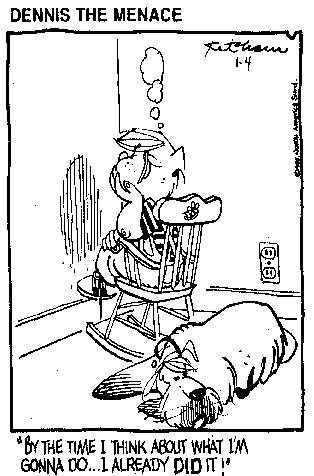











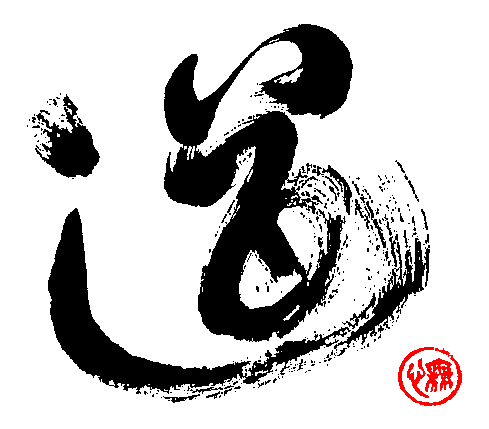










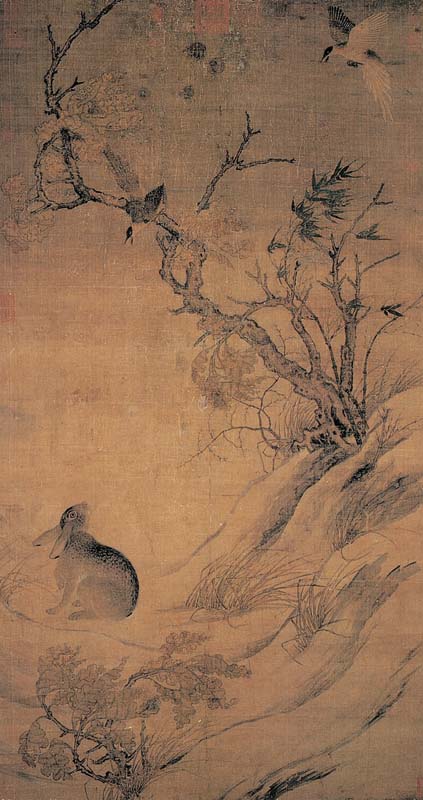





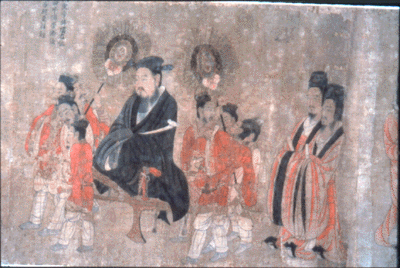
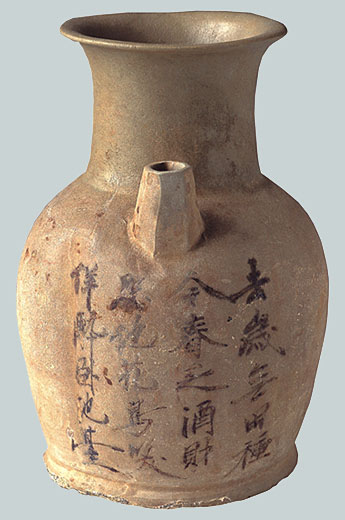



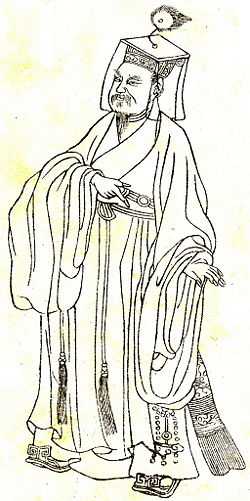

 The Tao Te Ching
The Tao Te Ching
